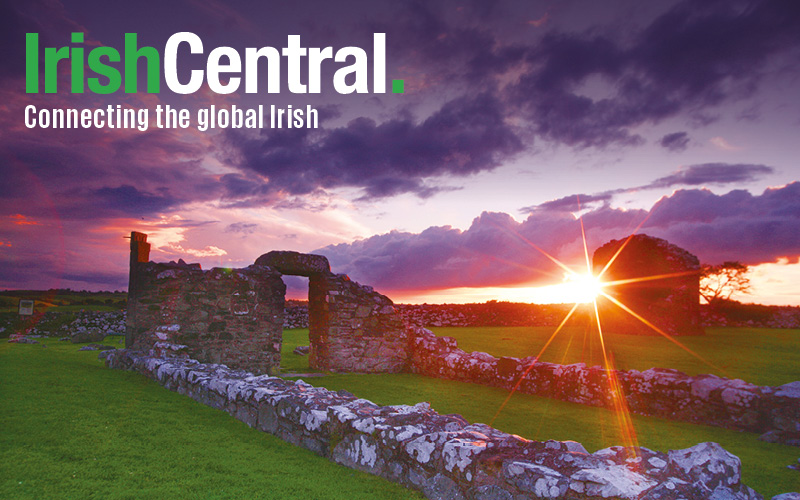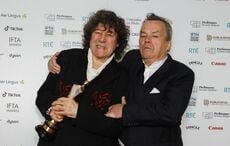People don’t just recommend that you watch an Ed Burns film; they seize you by the arm and just insist. It’s because they feel a deep personal connection to the kind of stories he writes. They get him and he gets them.
From the beginning of his career Burns has explored the Irish American experience in a way that few other writers and directors ever have.
Now fans of his work have reason to celebrate this holiday season. Apart from a cast reunion of sorts going on in The Fitzgerald Family Christmas, Burns is also making his cinematic return after two decades to the Irish American landscape that first made his career.
Back again are Michael McGlone and Connie Britton, who originally starred in The Brothers McMullen, but this time they appear as new characters from the kind of Irish background both they and Burns know like the back of their hands.
It all plays out with a certain inevitability while watching the film, which opens on November 20, but Burns insists it’s a happy accident.
“It evolved as I was writing the script,” Burns, 44, tells the Irish Voice. “I had a conversation with Mike and Connie a few months prior to writing the screenplay about the possibility of a McMullen sequel. I wanted to get their thoughts on where they thought their characters might be 20 years from when we left off.”
Then Burns started to think about other actors he’s worked with successfully, and he started to write parts for them.
“I had just worked with Caitlin Fitzgerald and Kerry Bishe in Newlyweds and I knew that I wanted them to play two of the younger sisters,” he reveals.
Once he had his four principals written and cast, he realized the film was about a family coming together for a reunion.
“And I decided to do the same with my own filmmaking family. I went through the casts of every film I have ever made and cast at least one actor from every film I have made,” Burns said.
“The great thing that happened was that so many of these actors had known each other for such a long time, so the minute we started rolling the cameras you had a sense that these people really did have a shared history, which is actually true. You really buy these guys as siblings.”
Tyler Perry, the hugely successful one man production company behind the Medea film series, was the figure who suggested that Burns return to what he knows best, his Irish American background. (Burns recently co-starred in Perry’s latest film Alex Cross).
“I don’t have any other explanation for why I haven’t tackled Irish America as a subject since The Brothers McMullen other than that I have been exploring other subjects and different parts of my life,” Burns confesses. (Married to one of the most beautiful women in the world, supermodel Christy Turlington and living with her and their two children in the millionaire heavy Tribeca neighborhood in Manhattan now, you can forgive him if the goings on in Long Beach aren’t always at the forefront of his mind).
“But when Perry asked me about Irish America the light bulb went off. It usually takes me about three to six months to finish a first draft. The script for Fitzgerald took six weeks.”
The reason was simple. Burns had been drafting the film in his head for years.
“I’d been sitting on these characters for 15 years. When you know a world so intimately, when you know the sights and sounds that surround these characters, when you know what their motivations are going to be you don’t come up against the usual roadblocks. “
Burns threw himself back into the kitchens, living rooms and bars of his childhood on Long Island.
“It just kind of poured out of me. There are probably more moments from my actual life and family experiences. I very rarely do that,” he says.
“There are things in there that my brother, who saw the film, loved but he told me afterwards, ‘I don’t know that I can watch it again.’”
The dead loss dad in The Fitzgerald Family Christmas (played flawlessly by Ed Lauter) is a real piece of work. Having walked out on his wife and kids years earlier, he leaves Burns’s character to become a surrogate father to his own siblings.
“My dad when he saw the film said, ‘Will you please stop this already?’ Everyone sees these films and thinks that I’m some version of these a******s.”
The truth, Burns says, is that in reality he has never written the kind of father figure that his own dad actually is.
“My father is the antithesis of these types of guys that I’ve written. Every one of these a****** fathers has been based on my grandfather. I don’t know what that is. I guess you need a bad guy,” he offers.
There’s nothing particularly Irish American about that setup, Burns insists. “People from all ethnic backgrounds have come up to me and said, ‘I’m not Irish and I’m not Catholic but how did you know my family?’ The more specific a thing is the more universal it is too. I focus on the little things that very family believes.”
Things have changed in Irish America in the two decades since Burns wrote The Brothers McMullen. Most dramatically, the relationship with the church has changed he says.
“I look at how my friends and I were raised and how we related to Catholicism versus my parents and the difference in the way our kids are changing too,” he says.
“But I am also surprised how strong Irish American ties to their own ethnicity remain when you’re talking about third fourth and fifth generation. They still hold on to them very strongly.”
For Burns it’s all a win in that he gets to profile the community he loves in a career he clearly adores.
“I feel very fortunate and lucky. My films don’t get a big splash when they’re released. They don’t make a ton of money. I’ve never made the big movie on a Friday night,” he says.
“Yet for whatever reason I have been very lucky that I get to make them.”
His modesty is remarkable in an industry not known for it. But Burns insists the work is the thing for him.
“My films are not cool, they’re not hip, and I’ve never aspired to be. What I’m interested in is being as honest as I can possibly be. These characters are real, they feel like characters you know, and I’ve been lucky to enjoy a pretty nice life from them.”
Every two years Burns finds the money, he gets his films made. Even finding the right locations can be a family affair.
“I asked my mother whose house could we use as the Fitzgeralds for the film. She called up some friends and eventually they allowed us to shoot in their homes,” Burns reveals.
“So I’m sitting in a dining room that I can remember from the third grade. And there’s my real family meeting my screen family.”
Out on Long Island, where Burns is from, the Irish are still reeling from Hurricane Sandy, and he knows all about it.
“Two of my cousins live out in Long Beach. Their homes were severely damaged and one of them looks like it’s going to be all right and the other one is just waiting to see,” he says.
“They’re all now living at my parents’ house in Rockville Center. Gerritson Beach, Breezy Point and the Rockaways, all these Irish enclaves have all been so hard hit.”
It’s the landscape of his childhood. It’s still the map Burns is connected to in his head and his films.




Comments